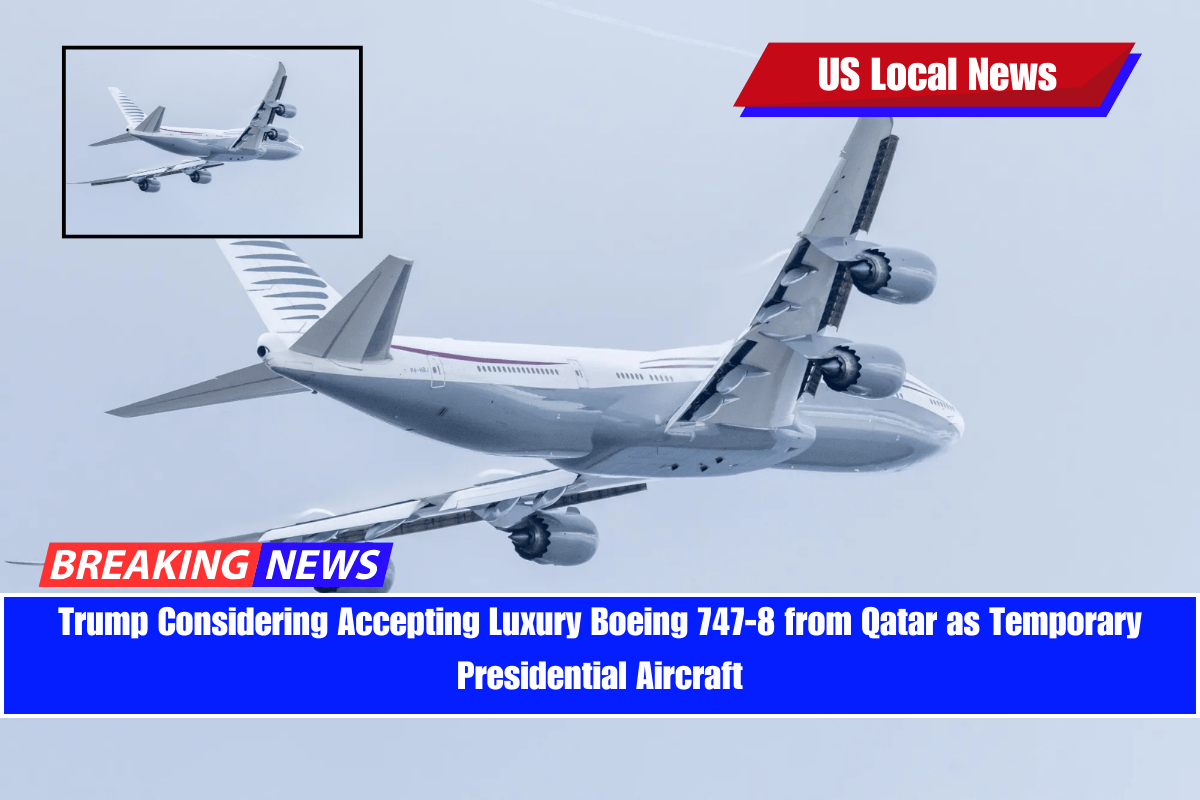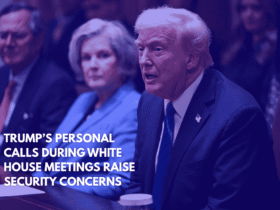President Donald Trump is reportedly set to accept a luxury Boeing 747-8 jumbo jet as a gift from the ruling family of Qatar during his upcoming trip to the Middle East. U.S. officials suggest the aircraft could be converted into a temporary presidential plane, though the decision remains under review by both the Qatari and U.S. governments. The news has sparked both intrigue and controversy, raising questions about ethics and security.
Qatar’s Gift: A Boeing 747-8 for Temporary Use
The Qatari government has yet to finalize its decision, but discussions have been ongoing about the potential transfer of the aircraft for temporary use as Air Force One, with plans for modifications to make it suitable for presidential use.
Qatar’s media attaché, Ali Al-Ansari, clarified that the matter is still under review by the Ministry of Defense and legal departments in both countries. No formal decision has been made yet.
In a post on his social media platform, Trump defended the idea, calling it a “fiscally smart” move. He argued that accepting a 747 aircraft as a gift from Qatar to replace the aging Air Force One, at no cost to taxpayers, would be a financially prudent decision.
“The fact that the Defense Department is getting a 747 aircraft to replace the 40-year-old Air Force One temporarily, in a very public and transparent transaction, so bothers the Crooked Democrats that they insist we pay, TOP DOLLAR, for the plane,” Trump wrote.
Concerns Over the Emoluments Clause and Ethics
While Trump’s defense of the idea hinges on cost-saving measures, it has triggered a wave of ethical concerns.
Under the U.S. Constitution’s Emoluments Clause, government officials are prohibited from accepting gifts, titles, or other benefits from foreign governments without Congressional approval.
Critics, including legal experts and government ethics advocates, have questioned whether this potential gift violates those principles.
Kathleen Clark, an ethics professor at Washington University School of Law, accused Trump of exploiting his position for personal gain. “He’s committed to exploiting the federal government’s power, not on behalf of policy goals, but for amassing personal wealth,” she said.
Political Reactions and Security Risks
The idea has drawn criticism from both sides of the political spectrum. Senate Minority Leader Chuck Schumer sarcastically remarked that Trump’s plan seemed contrary to his “America First” rhetoric. “Nothing says ‘America First’ like Air Force One, brought to you by Qatar,” Schumer quipped.
Some conservatives also voiced concerns about the security risks associated with using an aircraft provided by a foreign government. Air Force One, the current presidential aircraft, is equipped with advanced security and communications systems designed to protect the president in a variety of scenarios.
While the Qatari aircraft could be modified with some of these features, it would not have the same level of protection or capabilities as the current Air Force One planes.
The Boeing 747-8 and Its Modifications for Presidential Use
The aircraft being considered for the role of temporary Air Force One is a Boeing 747-8, a luxury jet with advanced capabilities. However, any conversion into a presidential plane would require significant modifications, including secure communications and classified systems.
Even with these changes, the aircraft would still fall short of the current Air Force One, which has additional features such as radiation shielding, antimissile technology, and air-to-air refueling capabilities.
While the aircraft could be equipped with basic countermeasures, it would lack some of the crucial systems that ensure the president’s safety and ability to command from the air in an emergency.
Trump’s Business Interests and Potential Conflicts of Interest
The gift of the aircraft also raises questions about potential conflicts of interest, particularly regarding Trump’s business dealings in the Middle East.
His family business, the Trump Organization, has significant interests in Qatar, including a luxury golf resort project in partnership with Qatar’s sovereign wealth fund.
This connection has led to concerns that Trump’s foreign policy decisions, particularly in the Middle East, could be influenced by his business interests.
White House officials have attempted to address these concerns by noting that Trump’s assets are held in a trust managed by his children. However, the trust agreement allows for deals with private companies abroad, which is a departure from the ethics rules in place during Trump’s first term when such deals with foreign governments were prohibited.
Ethical Concerns and Legal Analysis
Administration officials have reportedly prepared an analysis stating that accepting the aircraft would be legal under the current rules, despite concerns raised by critics. However, the debate continues as questions about the legality and ethical implications of accepting such a valuable gift remain unresolved.
The Bigger Picture: Security, Ethics, and Presidential Influence
The controversy surrounding the potential gift underscores broader concerns about foreign influence and presidential ethics. The public’s trust in a president’s ability to make impartial decisions in foreign policy, especially when those decisions may align with personal financial interests, is being questioned.
As the debate continues, both legal experts and political leaders are calling for transparency and accountability in how such gifts are handled, particularly given the implications for national security and potential conflicts of interest.











Leave a Reply